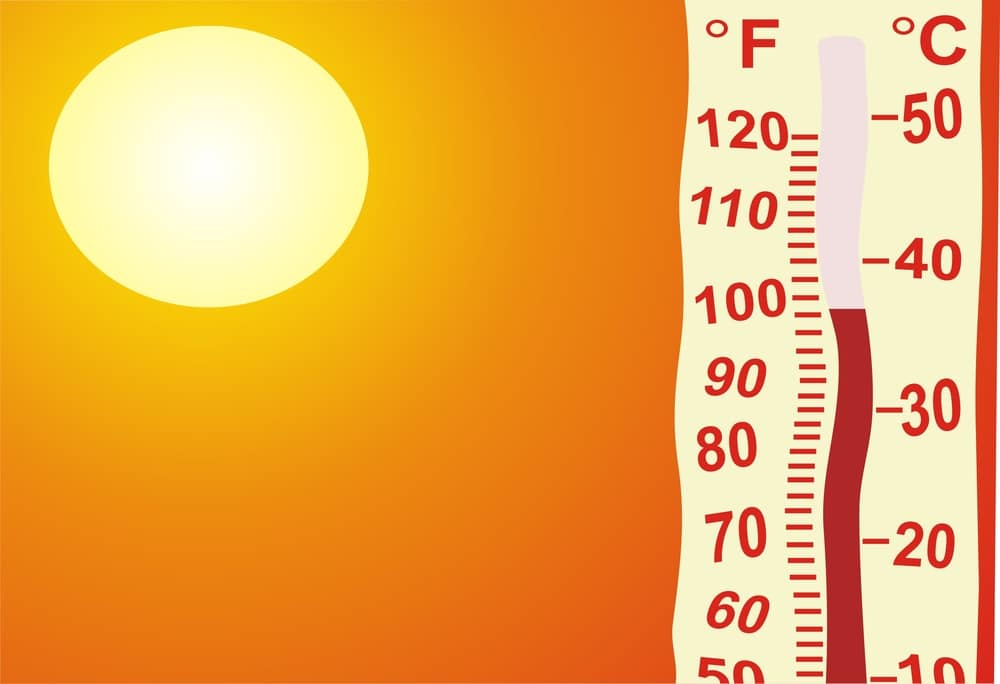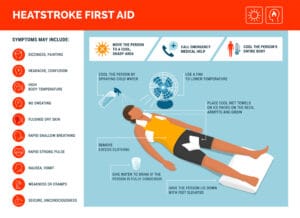Summer Safety Tips 2023 – [Guide to Avoiding Heat Stroke]

Summer is just around the corner and with that we all need to follow some basic Summer Safety Tips to keep our friends, family and coworkers safe. Summer comes with plenty of safety hazards that you’ll need to be aware of if you or your employees work outdoors. The high temperature and burning rays of sunlight are a constant source of health troubles during the summer months, and the adventurous recreational activities people enjoy during this season also present a certain degree of risk.
Luckily, summer safety isn’t all that complicated. As long as you learn what dangers to watch out for and how to avoid them, you should have no problem keeping yourself and your co-workers safe from the potential hazards.
Read on below for our carefully curated summer safety tips to help you and your loved ones stay safe.
What are the Biggest Summertime Hazards?
According to the summer safety experts, there are several persistent threats that everyone needs to be aware of during this hot and sunny time of year. These are the most common health hazards that people face when navigating this challenging season and engaging in potentially dangerous outdoor activities.

Extreme Heat
The high heat levels during the summer months can lead to a whole host of different health concerns, most notably heat-related illnesses such as heat stress. Given that many employees work outdoors this is the exact reason why OSHA has created training requirements to keep workers safe. For this reason our company has created specific training for employees to reduce heat illness.
These illnesses can have severe consequences and may even require an ambulance to be called in extreme cases. Luckily, if you just take a few simple precautions, you can avoid the worst of the ramifications of the unbearable summer heat.
Dehydration
The extremely high temperatures that can occur during this season are also known to cause problems with dehydration. If your body lacks moisture, this can lead to a wide range of health challenges that are all better off avoided.
‘That’s why it’s of the utmost importance that you and your children drink plenty of water and other hydrating fluids, especially during these hot and dry months when dehydration is a pressing concern.
Drowning
This hot and sunny season is the perfect time to take your children to the public pool for a swim. However, kids of younger age often have difficulty swimming, which can have disastrous consequences.
Drowning is one of the leading causes of death in young children, outranked by birth defects alone, so it’s imperative to practice basic water safety precautions and keep a close eye on your loved ones when going for a swim.
Sun Exposure
An often overlooked hazard when spending time outdoors is the bright hot sun. Prolonged exposure to UVB rays can put you and your children at risk for much more severe consequences than a simple sunburn.
In fact, skin cancer is strongly linked to increased UVB intake and can be difficult to treat for some. Check out our helpful tips below on avoiding this potential threat.
Disease
When you consider the climate and popular activities in June, July, and August, heat and water-related hazards make sense. But the conditions that come about around this time can also put you and your children at risk for certain diseases.
Most notably, West Nile Virus is known to wreak havoc in the US during this season. This is because mosquitos are very active at this time, and the virus is commonly spread through mosquito bites. Read on below for our disease control tips to see how you can keep your children safe from viruses like this.
Understanding the Signs of Heat Exhaustion
There are several tell-tale indicators that you can look for to determine if your child is suffering from a heat-related illness. The most notable will be an unusually high body temperature. Additionally, excessive sweating, pale skin, nausea, and fatigue are very clear signs. In extreme cases, a person experiencing this ailment may even vomit or lose consciousness. Recognizing the signs of overheating is the first step in learning to prevent heat stress.

Avoiding Heat Stroke
The best way to avoid this ailment is to stay indoors in the air conditioning on hot days. Wearing light-colored clothing and pausing to rest periodically in a cool place can help if you have to be outside in the heat, but limiting outdoor activity to cloudy days would be best.
Never leave children in the back seat of a car unattended on a hot day, even if they’re strapped into a booster seat with a seat belt. The temperature inside can escalate to dangerous levels more quickly than you think.
Avoiding Dehydration
Some helpful summer safety guidelines for staying hydrated are to always drink plenty of water or other fluids, especially when outdoors for long periods of time.
A sports drink is an excellent solution for quick and easy hydration, as it is fortified with electrolytes that can give you an extra boost. Avoid alcoholic beverages, however, as alcohol can cause you to become more dehydrated.
Staying Safe in and Around Bodies of Water
The most important thing about water safety is to make sure a responsible party is always paying attention. Parents should never leave their child without supervision near a pool or another body of water.
Kids and older adults are at the greatest risk of drowning, as their swimming skills are likely not as strong as younger adults. Therefore, it is crucial to keep an eye on these family members or ensure that a qualified lifeguard is always stationed nearby to protect them.
Preventing Death by Drowning
Life jackets are great resources that can be placed on your child as a preventative measure to keep them afloat. But once a person is already drowning, the most vital point is to recognize the signs so you can help them.
Rather than flailing and screaming, a drowning child is more likely to sink, gasp, and push their arms downward. If you notice these signs or others like glassy eyes or heads submerged too low in the water, you’ll need to act fast to save the drowning child’s life.

Avoiding Prolonged Sun Exposure
The best summer safety guideline for avoiding this threat is to wear the right clothing and sunscreen. Wear long pants and shirts with long sleeves to cover up your extremities. You can also wear a high SPF sunscreen to protect any exposed skin.
How to Treat Sunburn
Sunburn can affect anyone, regardless of skin tone or national origin. If you do get a sunburn, you can alleviate the pain by applying a cool compress. You should also wear loose-fitting clothing to avoid irritation and avoid using scented soaps on the affected area. Try to stay cool and in the shade until the affliction is healed.
Keeping Safe from Disease
As insect bites are a significant cause of seasonal diseases like the West Nile Virus, you should always use insect repellent and avoid mosquito-heavy areas, like anywhere with standing water. Additionally, any bodily injuries should always be kept clean and covered to avoid infection.
Other Natural Hazards
If you decide to hike in the woods or explore your natural surroundings, be wary of plants and animals that can do you harm. Poison ivy and venomous spiders can do a lot of damage. If you happen to get a rash from poison ivy, clean the affected area as soon as possible with rubbing alcohol, soap, and water.
Other Man-Made Hazards
You may have a false sense of security while you’re having fun at your 4th of July cookout, but there are still dangerous elements at play that can harm you. Keep children away from potentially hazardous objects like hot grills and fireworks displays to prevent them from sustaining injuries.
Keep Your Family and Co-Workers Safe This Summer by Following These Tips!
The brutal summer heat and the potentially dangerous outdoor recreational activities that come with the season can present health hazards for the whole family. Likewise, if you work outside you and your co-workers will want to take heat stress seriously. After all, OSHA takes heat stress seriously. But by following these simple summer safety guidelines, you can make sure that you are protected from whatever threats come your way.